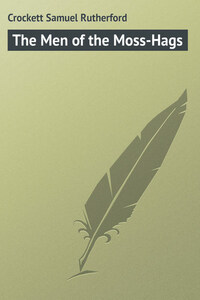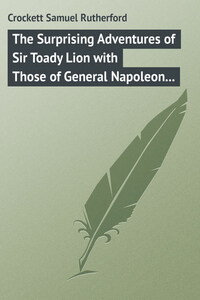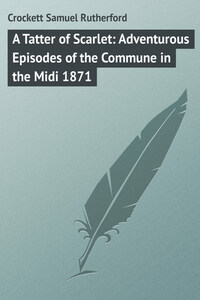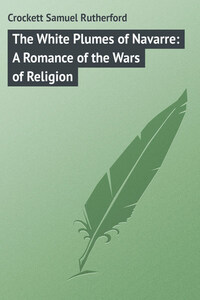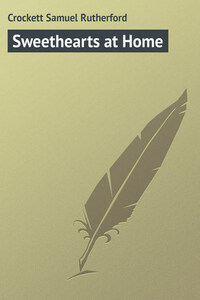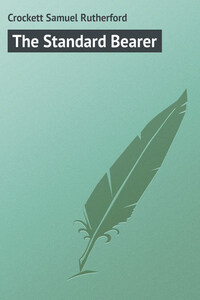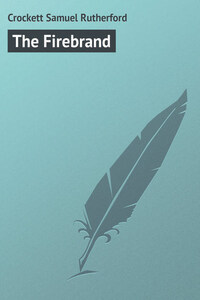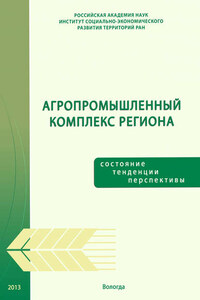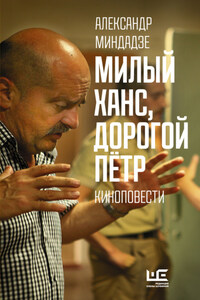CHAPTER I.
MY GOSSIP, MAISIE MAY
It was upon the fair green braes that look over the Black Water of Dee near by where it meets the clear Ken, that Maisie May and I played many a morning at Wanderers and King's men. I mind it as it were yesterday, for the dales and holms were pranked out with white hawthorn and broad gowans, and by our woodland hiding-places little frail wildflowers grew, nodding at us as we lay and held our breath.
Now Maisie Lennox (for that was her proper given name) was my cousin, and had been gossip of mine ever since we came to the age of five years; Sandy, my elder brother, making nothing of me because I was so much younger and he ever hot upon his own desires. Neither, if the truth must be told, did I wear great love upon him at any time. When we fell out, as we did often, he would pursue after me and beat me; but mostly I clodded him with pebble stones, whereat I had the advantage, being ever straight of eye and sure of aim. Whereas Sandy was gleyed1 and threw stones like a girl, for all the stoutness of his arm.
But that is not to say like Maisie Lennox, who was Anthony Lennox's daughter, and could throw stones with any one. She lived at the Lesser Duchrae above the Black Water. As for me I lived at Earlstoun on the hillside above the Ken, which is a far step from the Duchrae. But our fathers were of the one way of thinking, and being cousins by some former alliance and friends of an ancient kindliness, it so happened, as I say, that Maisie Lennox and I played much together. Also my mother had great tenderness of heart for the bit lass that had no mother, and a father as often on the moors with the wildfowl, as at home with his one little maid.
For the times were very evil. How evil and contrary they were, we that had been born since 1660 and knew nothing else, could but dimly understand. For though fear and unrest abode in our homes as constant indwellers, with the fear of the troopers and plunderers, yet because it had always been so, it seemed not very hard to us. Indeed we bairns of these years played at Covenanting, as it had been the game of "Scots and English" on the hillside, even from the time when we first began to run alone.
Well do I mind that day when I pleaded and fleeched on my father to take me before him on Gay Garland, as he rode to the Duchrae. It was a brisk May day with an air vigorous as a draught of wine, yet cool, clear, and sweet as spring water is – a pearl of a day, such as hardly seems to come in these sullen later years.
So I cried out upon my father to take me. And as his manner was, he told me to inquire of my mother. But I desired rather that he should ask for me himself. So I lingered about the doors till he should ride forth upon his great black horse, that he might catch me up beside him on the cantle and cry in at the door, "Mother, I am taking William," as was his kindly wont. Never a man so brave and true and simple as my father.
While I bided there, Alexander my brother seeing me wait, called me to come with him to the hill. But because my heart was set to ride to the Duchrae with my father, I had no desire to go to the rabbit hunting. So when he saw that I would not company with him, he mocked me and called me "Lassie-boy!" Whereupon I smote him incontinent with a round pebble between the shoulder-blades, and he pursued me to the hallan door within which was my mother, looking to the maids and the ordering of the house.
From thence I mocked him, but under my breath, for fear that for ill-doing my mother would not permit me to go to the Duchrae.
"Stable-boy!" I called him, for he loved to be ever among the lowns of the wisp and currying comb, and as my mother said, grew like them even in manners. "Faugh, keep wide from me, mixen-varlet!"
